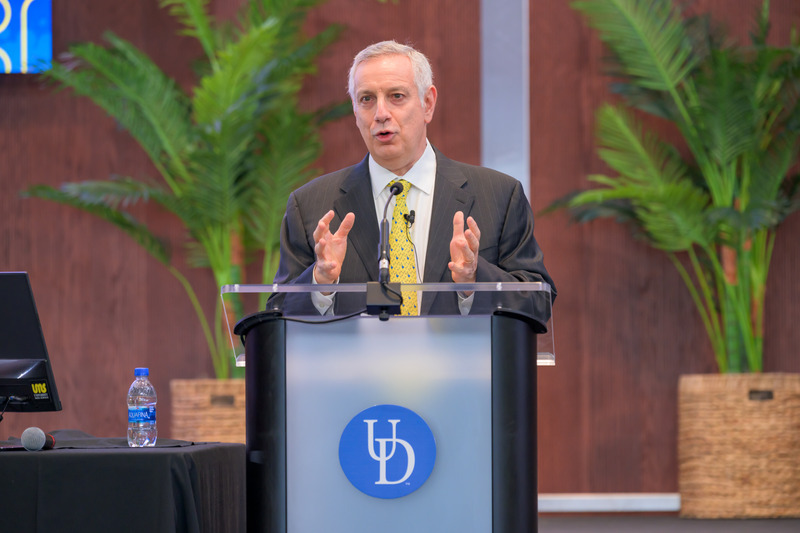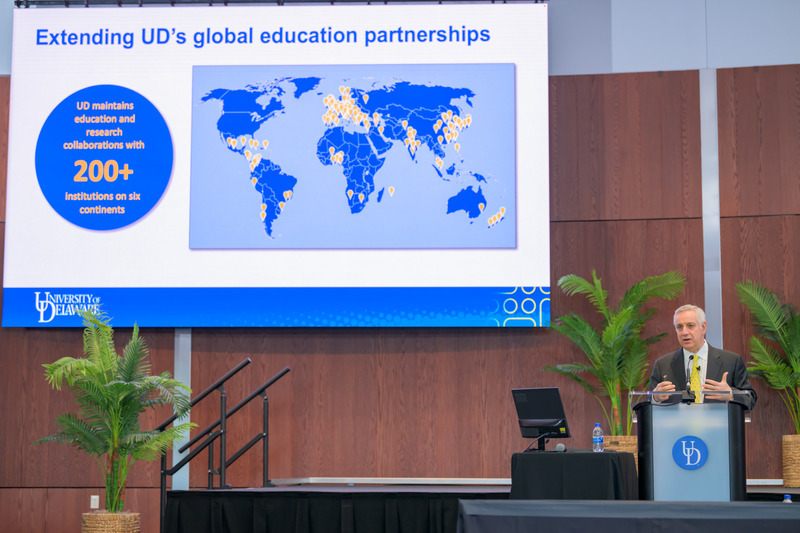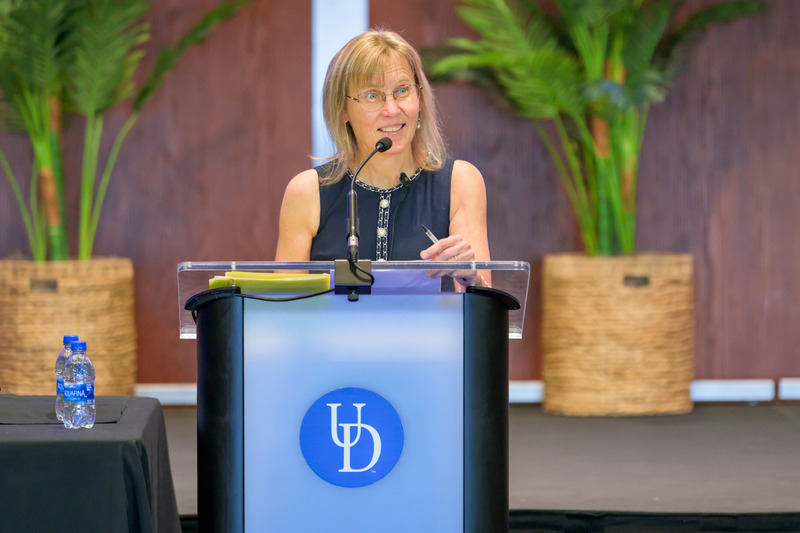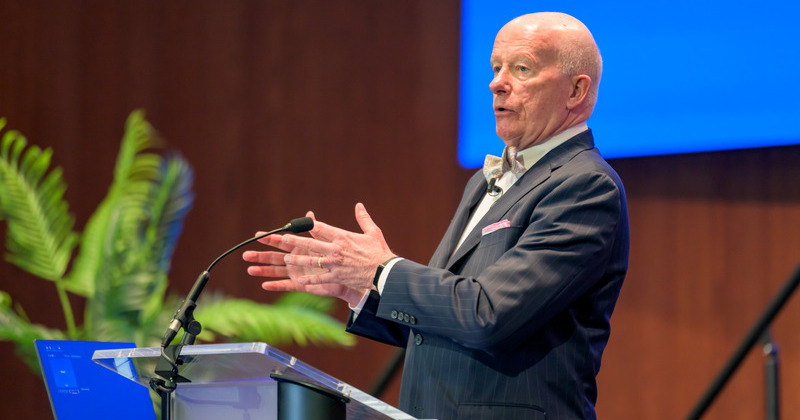


UD Board of Trustees holds special meeting
Photos by Kathy F. Atkinson and Evan Krape March 27, 2023
President Dennis Assanis shares highlights and path forward
The University of Delaware has been committed to education, research, innovation and service throughout its history — and it continues to do all that and more today, President Dennis Assanis said at a special meeting of the Board of Trustees on Tuesday, March 21.
“Education is at the very core for everything that we do with our faculty and our students, leading to great discoveries, the innovations that fuel our economy and of course the impact that we have,” Assanis said.
At the meeting, which was held in the Audion of the Tower at STAR, Assanis highlighted many of the accomplishments of the University and also shared insights on the path forward.
Again this year, UD has received a record number of undergraduate applications, Assanis said. Applications increased 6.5% from last year, which included an increase in applications from Delawareans, international students and underrepresented minority students.
“That shows the great confidence that people have in the programs that we offer here at the University,” Assanis said.
UD continues to advance diversity, equity and inclusion, Assanis said. The number of underrepresented minority undergraduates continues to increase every year, and since 2010, there has been a 74% increase in first-generation students and a 28% increase in Pell Grant recipients attending UD. The University also provides more undergraduate financial aid each year, up 71% since 2016.
“These are some great outcomes that obviously we are completely committed to,” Assanis said. “To that end, everybody here on campus is continuing to work very hard to strengthen our DEI resources and initiatives. It does take a village to really produce outcomes. Diversity is in every single facet of our life.”
In that context, the University has hired a new assistant director for the Office of Equity and Inclusion and deputy Title IX coordinator. The Division of Student Life, along with the Office of Institutional Equity, has also launched an Advancing Racial Equity and Inclusion strategic plan. The Center for Intercultural Engagement, which will include an interfaith meditation and prayer room, ablution stations and all-gender restrooms, is set to open in the Perkins Student Center later this spring.
The University is working to grow its community of international students since the drop in enrollements experienced due to the pandemic. While the international graduate enrollments rebounded within a year, it has taken till this year to see a significant increase (26%) in international undergraduate applications.

UD maintains education and research collaborations with more than 200 institutions on six continents. “Our University is being recognized more and more globally,” Assanis said. “We're actively working to diversify our portfolio of partnerships. We’re pretty much on all the continents. Two hundred-plus global partners sounds like an impressive number, and it is, but it’s about the depth of those relationships and the kinds of partnerships that we’ve built.”
A faculty hiring and retention plan is being developed to strategically grow the faculty in alignment with enrollment and other resource needs. UD has added about 100 faculty positions since 2016. With new members and replacements, about a third of the University’s faculty have come to UD in the past six years, bringing fresh energy and perspectives and enhancing existing excellence.
“We’re not going to rest on our laurels,” Assanis said. “There’s still tremendous room to grow, and we’re very, very excited about the future.”
Equally exciting, Assanis said, is continuing to reimagine the University's physical capital. The full opening of the Fintech Innovation Hub on the Science, Technology and Advanced Research (STAR) Campus is anticipated for this summer. “Building X,” which will replace McKinly Lab and provide research and teaching spaces for multiple departments including biology, psychology, neuroscience, physics and quantum science, is scheduled to be completed in fall 2024. The 25,000-square-foot addition to Drake Hall, which features teaching and research labs for chemistry and biochemistry, is now complete.
Also at the meeting, Provost Laura Carlson discussed expanding flexible and non-traditional pathways that lead to UD degrees. An offer of admission is both a promise and an obligation, she said, and ways to fulfill that promise include expanding Winter and Summer Sessions and broadening inclusive pathways such as UD’s Associate in Arts Program and its partnerships with Delaware State University and Delaware Technical Community College.

“Students are not all the same, and this generation of students might need something more, so I really believe that we need to be more adaptive and inclusive and understand that the traditional approach isn’t going to work for everyone,” Carlson said. “What we're interested in is thinking about multiple pathways that can all lead to a UD degree —that’s a much more inclusive approach.”
During the meeting, Gary Henry, dean of the College of Education and Human Development, discussed ways that the University is partnering with school districts throughout Delaware to address the teacher shortage crisis in the state as well as a recent drop in student achievement and outcomes that has been caused, in part, by the pandemic.
“It's a very special and what I think of as a reciprocal relationship,” Henry said. “As the P-12 education system does better and produces more and better students, UD benefits from those students coming to the University. And as we do better in terms of preparing teachers and citizens to go out and support public education, the P-12 education system does better itself.”

Enrollment in teacher preparation programs has dropped nationally over the past decade, but the issue is particularly acute in Delaware, Henry said. About 85 UD graduates enter the Delaware public school system each year, accounting for about 20% of the new teachers that are needed every year in the state.
“I think it's an obligation to the state to help serve schools and help dig out of that crisis,” Henry said, adding that CEHD deposits are up 100% over last year. “We've got to address this teacher shortage in Delaware with a systemic response, reaching down into the high schools, motivating and encouraging those students to come to UD, providing them the educational opportunities and internship opportunities that they need to prepare themselves to teach, and then working with Delaware schools to place them in those schools so they stay in Delaware.”
Contact Us
Have a UDaily story idea?
Contact us at ocm@udel.edu
Members of the press
Contact us at 302-831-NEWS or visit the Media Relations website

